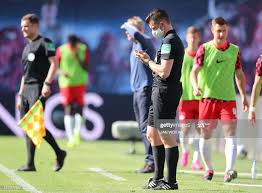Uruguayan World Cup referee Andres Cunha spoke live on Instagram with Balon Latino on how he is experiencing inactivity with his colleagues, the economic situation and some of his recent experiences on the field of play.
- What kind of personality must a referee have?
- We are trained to keep the balance, not to pull out, and must have the ability to be calm. You get angry but it goes deeper inside, we try not to show it. Now that we have communications systems, they can tell you about your anger, but our job is to do justice. Many times we would like to remove a player from the field for being annoying, but we are here to measure their behavior, not to do what we would like.
- Does the referee sense when a player is on the verge of being sent off?
- When a player gets a yellow card at 20′ and continues to protest it is complicated, the referee tries to talk to the player to lower the intensity. If a player insults me, I kick him out. The player decides it, through his behaviour, not the referee. Our emotions should not influence game decisions.
- Which referees did you like?
- Collina, Larrionda, Baldassi, Elizondo were great referees. I paid a lot of attention to the German referee Markus Merk. There are many that have been at the top, both on continental and world level. In Russia 2018 we shared the time with Collina and he has a strong personality.
- Is it difficult to referee in Uruguay?
- Yes, it is very polarized. In other countries, you could go to remote cities if you have any problem. For example, if you have a problem in Rio de Janeiro you can referee elsewhere. Here, if I'm wrong for one side, I'm a fan of the other one and vice-versa. We are passionate in Uruguay and there is a lot of fervor, not only on the field, but also outside.
- How do you handle yourself on a daily basis?
- I am not a person to walk all day on the street, but if I have to go out I go. I have had no problems except for a look or a scream, but nothing out of the ordinary. For example, after the classics, I take care of myself for a few days or if there is a lot of controversy I try not to go out.
- Does it hurt when people campaign so you don't referee games?
- We are sanctioned by the Referees Committee, we see the plays and we do our self-criticism there. We do not do it publicly, but we are aware of our mistakes. Sanctions hurt us, like everyone else. To understand the referee a little more, the fans have to understand that we do not like to be wrong, because it influences the sanctions, the economic and our name.
- How did you approach the World Cup semi-final?
- For me, the teams on the field are blue or red; I do not notice who is wearing a certain shirt. I experienced it as one more game; after I tossed the coin, it was a divine match, the first foul came after 15 minutes of play. Both teams wanted to play cleanly.
- Is an elimination match uncomfortable?
- Belgium-France was demanding from the physical point of view, but in terms of discipline it was not as demanding. You only have to position yourself well. I enjoy all the games.
- Were you surprised by any player in your career?
- At the World Cup they gave us information about the players, their physical and technical attributes. I saw data on players that are incredible. Hazard and Mbappe have tremendous speed, which means that the referee must have a good strategy.
- What is it like to referee in Brazil? Is the environment difficult?
- People show their feelings a lot, I like that kind of games. We have to pass many filters to reach this level.
- Did you feel pressure?
- It would not speak well of me to tell you that I do not feel pressure. It doesn't happen to me and it shouldn't happen to me because I would have to consider my career. Here in Uruguay I have gone through worse situations than abroad, always talking about security. It doesn't change my refereeing when there are 2 or 50,000 fans.
- Are experienced players allowed to protest here?
- It can happen, but the “veterans” have a different way of speaking to enter into dialogue. Many times it seems that we let them speak too much because the captain comes over five times in one half and he is not sanctioned, but a “junior” comes and is warned; the difference is in the way of each one. I try to challenge them, but I don't like to sanction. Players who are retired had other codes than now; you were never going to hear them speak badly about a referee on Monday, after the game.
- On what do the referees depend now without activity?
- In Uruguay, international referees have three fixed payments per month, but in March we were not paid the total amount; there were only two payments. In April it was just one. We are being very affected economically.











































